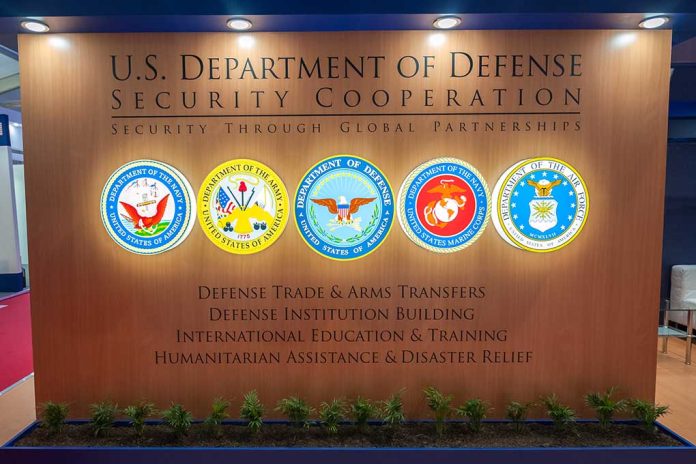
China imposes sanctions on nine US defense firms over military equipment sales to Taiwan, escalating tensions between the two superpowers.
At a Glance
- China sanctions nine US defense firms for arms sales to Taiwan
- US approves $228 million sale of spare parts to Taiwan’s military
- Taiwan has been a major buyer of US military equipment for decades
- US-Taiwan relations are guided by the 1979 Taiwan Relations Act
- China views Taiwan as its territory and opposes US support
China’s Retaliatory Sanctions
In a bold move that further strains US-China relations, Beijing has imposed sanctions on nine US defense firms involved in military equipment sales to Taiwan. The Ministry of Foreign Affairs in Beijing announced these measures, which include freezing the property of the sanctioned firms in China and prohibiting transactions with China-based entities. This action comes in direct response to the US State Department’s recent approval of a $228 million sale of spare parts to Taiwan’s military.
China strongly condemns and firmly opposes the US arms sales to Taiwan, and has protested to the US. As a countermeasure, China has announced sanctions against 9 US military companies. pic.twitter.com/CB9xqApqxu
— Spokesperson发言人办公室 (@MFA_China) September 18, 2024
The sanctioned firms include Sierra Nevada Corporation, Stick Rudder Enterprises, Cubic Corporation, S3 Aerospace, TCOM Ltd Partnership, TextOre, Planate Management Group, ACT1 Federal, and Exovera. China views these arms sales as a violation of the one-China principle and a threat to its sovereignty, demanding that the US cease support for what it perceives as Taiwan’s declarations of independence.
US-Taiwan Arms Relationship
Taiwan has been a significant purchaser of US military equipment for decades, with sales totaling nearly $50 billion in defense equipment and services since 1950. The relationship is underpinned by the Taiwan Relations Act of 1979, which commits the US to provide Taiwan with military support for self-defense. This longstanding arrangement has been a consistent source of tension between Washington and Beijing.
Despite the diplomatic shift in 1979 when the US officially recognized Beijing instead of Taipei, America remains Taiwan’s most crucial partner and arms supplier. The US maintains a policy of “strategic ambiguity” regarding Taiwan’s defense, balancing support for the island with its complex relationship with China.
Strategic Importance of Taiwan
Supporting Taiwan is crucial for US security, economic interests, and political values. Taiwan’s strategic location in the Asia-Pacific region and its role as a critical hub in global semiconductor manufacturing make it an invaluable ally. The island’s democratic system also aligns with American values, further justifying US support in the face of China’s increasing pressure.
China has been modernizing its military forces and preparing for a potential conflict in the Taiwan Strait. This military buildup, coupled with increasing political and economic pressure on Taiwan, has led to heightened concerns about regional stability. The US arms sales are seen as a counterbalance to China’s growing military capabilities and a deterrent against potential aggression.
Implications for US-China Relations
The latest sanctions mark another point of contention in the already strained US-China relationship. The two nations have clashed over various issues, including trade, technology access, and actions in the South China Sea. The Taiwan issue remains a critical flashpoint, with Chinese officials consistently warning that it is a core interest that could lead to conflict if mishandled.
China announced steps against nine US military-linked firms over weapons sales to Taiwan, freezing their property within China, to pressure the United States to halt its arms sales to the island. The US is a key backer and arms supplier for Taiwan https://t.co/w13lxYgXym
— Reuters (@Reuters) September 18, 2024
Recent high-level diplomatic engagements, such as the meeting between White House aide Jake Sullivan and Chinese military official Zhang Youxia, have highlighted the centrality of the Taiwan issue in bilateral relations. As tensions persist, the international community watches closely, aware that the delicate balance in the Taiwan Strait has significant implications for global security and economic stability.
Sources:
- China sanctions US defence firms over arms sales to Taiwan
- U.S. Military Support for Taiwan in Five Charts














